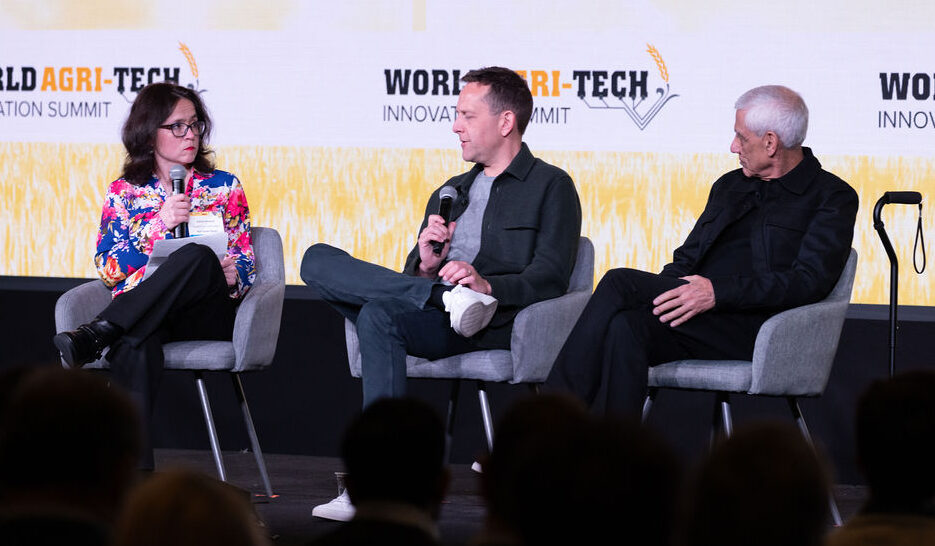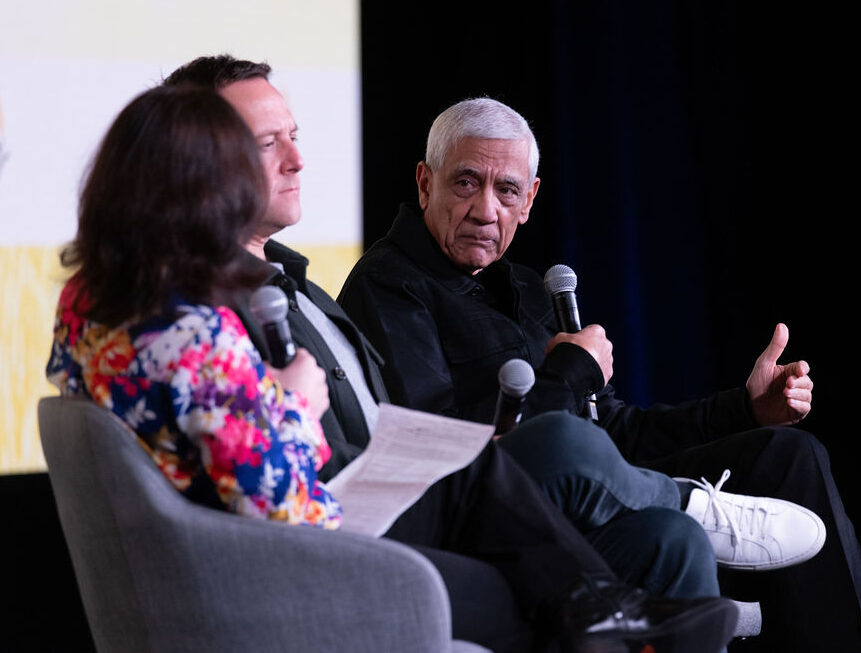Vinod Khosla and Dave Friedberg struck a largely positive note on stage at the World Agri-Tech and Future Food-Tech conferences in San Francisco last week despite the ongoing funding winter.
While AgFunder reported a 49.2% decline in agrifoodtech funding in 2023 and many startups face the abyss this year without a fresh influx of capital, money is always available for exceptional founders with disruptive products or technologies, insisted Dave Friedberg, CEO at investment group The Production Board (TPB) during a panel debate with Khosla Ventures founder Vinod Khosla last Tuesday.
“Exceptional founders have nothing to worry about,” said Friedberg. “But being a founder doesn’t give you the privilege of being able to raise money. And so that’s a fundamental truth that everyone’s going to get hit in the head with at some point. You can’t blame the market.”
“That is so true,” agreed Khosla. “There are so many me-too kinds of startups. In fact, what I would argue is what the market has done is separated the really good startups from the not so good… Markets go up and down and you have to roll with the punches.”
Vinod Khosla on cultivated meat: ‘We’ve probably looked at two dozen business plans, and not one made economic sense’
Khosla, who highlighted his firm’s investments in Nitricity (on-farm nitrogen), Leaft (Rubisco protein), Impossible Foods (plant-based meat), Vertical Oceans (high-tech shrimp farming), Climate Corp (ag data), and Blue River (ag robotics) over the years, said: “I don’t think there are any areas I would say we’ve pulled back from. By definition, a category that’s already popular isn’t one where future innovation is happening. If you’re doing something different and really innovative, you will make money.
“I think there are a lot of diamonds in the rough that will go public. What I would say is the negative perceptions come from a lot of followers who do undifferentiated things.”
He added: “Look at cell-based meats. We probably looked at two dozen business plans and not one made economic sense to us so we never invested. But every one of them got funded, mostly at hyped valuations. I don’t think that’s a category that works, at least today, unless somebody has a huge breakthrough. But we always keep looking because somebody might have that breakthrough.”
Programming biology
Friedberg observed: “From a capital market perspective, a lot of folks have lost money, but there are still investors who are finding opportunities who are willing to make long-term bets. In this particular moment, certain technologies are advancing at such a clip that they’re going to do better than anyone that was pouring money in [to this sector] in the 10 years before the masses of capital that was flowing into this market space [ever anticipated].”
He added: “Predictive modeling coupled with the low cost of generating data from biological systems, coupled with automation, coupled with machine vision, created really big step changes in the unit economics and productivity potential of a lot of systems, particularly in agriculture.”
Friedberg, who recently took over as CEO at Ohalo, a plant genetics startup he’d invested in through The Production Board, said he was particularly excited about the ability to program biology—from plants to microbes to animal cells—coupled with advances in AI and machine learning, enabling firms to do R&D work at breakneck speed.
“I think in molecule engineering, cell engineering, system engineering… if you model transcription factors in organisms, AI is allowing us to think at a larger scale and be accurate and predictive at that scale, and then engineer an outcome with respect to our objective.
“If you can shorten the time to driving, testing, measuring and realizing outcomes from predicting and making changes in genome-driven systems, that value can compound and you can very quickly take entire markets and create extraordinary value.”
TPB recently invested in Triplebar Bio, which has developed a ‘hyper-throughput’ screening platform deploying microfluidics and rapid testing. This is coupled with AI and machine learning to develop more efficient biomanufacturing platforms utilizing microbial or animal cells, said Friedberg.
“By using droplet microfluidics, they can run 10,000 experiments a second. And so rather than wait for a cellular engineering system to grow in the media and then you measure it and you’re onto your next experiment, you can parallelize and scale up very quickly.
“So there are a lot of these first derivative unlocks that start to create real compounding value and obviously a lot of the work we’re doing at Ohalo is trying to unlock these accelerating factors that we believe will compound value.”

Exits
As for exits, said Friedberg, “I think there have been a lot of smaller acquisitions that don’t get as much press coverage, particularly on the hardware side; so there’s definitely acquisitions, but the ag cycle is very long.
“And right now we’re in a very negative period of the cycle and so the big ag acquirers are really challenged to make acquisitions. They’re not going to make acquisitions just to bolt stuff on or add stuff on when the market is in a condition like it is right now. But when there is something that is fundamentally disruptive to their core business, they will have to and they will have to pay a lot more than they’re comfortable or willing or want to. So I think there’s going to be a few of those deals in the next couple of years.”
‘The silly money has moved to AI now’
According to Khosla: “The silly money seems to have moved to AI now and all the valuations are [now] so out of kilter. The vast majority of AI investments will lose money. But the good news is that a few will make a lot of money, so more money will be made than lost. We invested in OpenAI five years ago when nobody was investing in AI. As with anything, you want to invest out of cycle.”
Is venture capital a good fit for agrifoodtech?
As to whether venture capital is a good fit for agrifoodtech, said Khosla, “I think most people have the wrong perception of venture capital. We always take a long view and fundamentally invest in real technology innovation, which takes longer. Consumer software is different and so people equate that to venture capital, but we’ve also invested in fusion. It takes 12 to 15 years to get to first revenue; that’s long-term.
“What you want to do is make sure you’re building value. Take Impossible Foods. We’re still investors and holding on to everything because it’s one of the few companies in that category that’s still growing, while most companies are doing poorly.”
He added: “All of climate investing is very long term. Biotechnology is mostly very long-term. Robotics is the same way… You don’t launch a project overnight and become a success like you’re a consumer app. That happens occasionally in software, but most things are hard. I like to say not all hard things are valuable, but most valuable things are really hard.”
Further reading:





